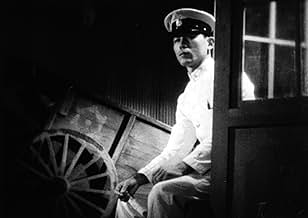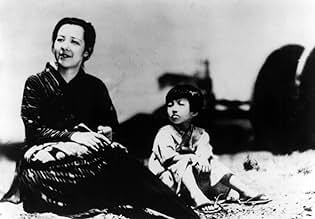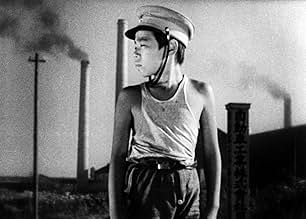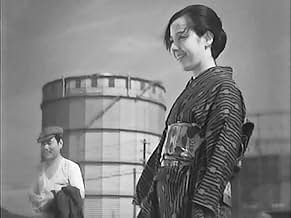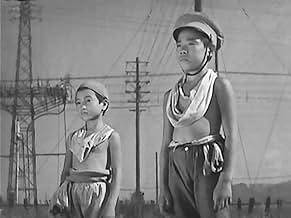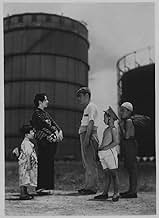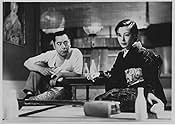IMDb RATING
7.4/10
1.8K
YOUR RATING
Unemployed Kihachi and his two sons struggle to make ends meet. But that doesn't keep Kihachi from wooing single mother Otaka.Unemployed Kihachi and his two sons struggle to make ends meet. But that doesn't keep Kihachi from wooing single mother Otaka.Unemployed Kihachi and his two sons struggle to make ends meet. But that doesn't keep Kihachi from wooing single mother Otaka.
- Director
- Writers
- Stars
- Director
- Writers
- All cast & crew
- Production, box office & more at IMDbPro
Featured reviews
This is a silent film by Ozu, and it is brilliant both in its simple telling of the story and its development of the characters. This film is about a father, Kihachi, who has two small sons and is looking for work, so they can eat. He meets a young mother with a daughter and for a while she is out of the film. Near the end of his rope, he runs into an old female friend, who finds work for him and enables the boys to go to school. The young mother has come to the town with her daughter and he looks to help her, but is also interested in her. As simple as this sounds, the film is wrought with emotion, and is brilliant in that your own thoughts could be somewhat mixed about this. Shouldn't he be more grateful to the (female) friend who helped him find work? One of Ozu's best qualities is to show sadness, happiness and fear in its most basic, raw forms. The acting, even by the children, is uniformly wonderful. Even Mr. Ryu, whom I believe to be one of the greatest if not the greatest character actors in film history, is in this film in a small role. Ozu's films are methodically slow moving mostly, this one included, but I have always felt that prospective film makers should study his work to understand the virtues of simplicity in telling a story on film. Up there with Ozu's best. Possibly not as good as "Tokyo Story" and "Late Spring" but very highly recommended.
This film deals with an unemployed man and his two sons who rover through the industrial areas of Tokyo during the depression in the search for work.
After some bad luck the father is able to find a job but then the pity for a single mother and her sick little daughter makes him do something he should not have done.
This is the very simple story but this is not what makes the film a masterpiece. The great achievement is that Ozu shows how poverty affects the human mind. He depicts the fear and the feeling of senselessness in a way that nobody else has ever done. Many of the devices him employs are very imaginative. Many people might compare this film to de Sica's "Ladri di biciclette" which was made 12 years later. But without doing a disservice to de Sica's masterpiece: "Tokyo no yado" is the best film that was ever made about poverty and unemployment,
After some bad luck the father is able to find a job but then the pity for a single mother and her sick little daughter makes him do something he should not have done.
This is the very simple story but this is not what makes the film a masterpiece. The great achievement is that Ozu shows how poverty affects the human mind. He depicts the fear and the feeling of senselessness in a way that nobody else has ever done. Many of the devices him employs are very imaginative. Many people might compare this film to de Sica's "Ladri di biciclette" which was made 12 years later. But without doing a disservice to de Sica's masterpiece: "Tokyo no yado" is the best film that was ever made about poverty and unemployment,
10mgmax
The richly moving story of a hard-luck father and his two children, this masterpiece of unadorned realism may remind you more of Italian films like Shoeshine than Ozu's more staid work of the 50s. (The inspiration was probably Vidor's The Crowd, and a comparison with that masterpiece is by no means out of order.)
This early great work from The Master is a sobering melodrama honed squarely on a single unemployed, homeless father struggling to feed and shelter his two sons. Ozu does a fine job capturing the dynamic between the two boys by themselves and with their father, but the film really gets interesting when two women enter the story: a young single mother, also homeless, and an old friend who finds the father a job. The maudlin climax seems to anticipate Ford's GRAPES OF WRATH and DeSican melodrama -- though in the wrong ways -- but prior to that Ozu comes up with an quirky expressionist sequence to reflect the father's unraveling moral state.
10kerpan
I would argue that "Tokyo no yado" (Inn at Tokyo) is not only one of Ozu's best films, but one of the best films by anyone ever. It tells the story of an unemployed and homeless single father (Takeshi Sakamoto) with two sons (the elder of the two being the wonderful Tomio Aoki) looking for work in depression-era Tokyo, whose lives intersects with those of a single mother (the marvelous Yoshiko Okada) of a little daughter likewise forlornly seeking a way (and a place) to live. The children can find moments of happiness in the undustrial wasteland -- and their parents can briefly recollect their own happiness as children. The boys have a brief idyll, after their father gets a job with the help of an old friend (Choko Iida), even getting to go to school (a pleasure they value almost as much as having a fixed home and a dependable supply of food). Things, however, become troubled again when the family loses track of the mother and girl (who have not found any "angel" to help them out). A film that is strikingly beautiful -- and more than a little heart-breaking. It is marred by a tiny section that seems overly melodramatic right before the end (but this might be due to infelicities of the intertitles -- or at least of their translation).
Did you know
- TriviaThe credits indicate that the script was based on an original work by a foreign writer with a name that sounds like "Winzart Monet", but it is actually a gag name, derived from "without money".
- ConnectionsFeatured in A Story of Children and Film (2013)
Details
- Release date
- Country of origin
- Language
- Also known as
- Un alberg a Tòquio
- Production company
- See more company credits at IMDbPro
- Runtime
- 1h 19m(79 min)
- Color
- Sound mix
- Aspect ratio
- 1.37 : 1
Contribute to this page
Suggest an edit or add missing content

